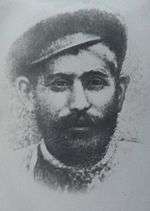Early life of Joseph Stalin
Childhood
Birth
Stalin's birth name in Georgian was Ioseb Besarionis dze Jughashvili (იოსებ ბესარიონის ძე ჯუღაშვილი). He was born an ethnic Georgian, but Georgia at the time was part of the Russian Empire. The Russian version of his birth name was Iosif Vissarionovich Dzhugashvili (Иосиф Виссарионович Джугашвили).
Stalin was born in Gori in the Tiflis Governorate of the Russian Empire, to Besarion Jughashvili, a Georgian cobbler who owned his own workshop,[1] and Ketevan Geladze, a Georgian who was born a serf. He was the youngest of their three boys; their two previous sons died in infancy.[1]
Early life
Initially, the Jughashvili family prospered, but Joseph's father became an alcoholic, which gradually led to his business failing and him becoming violently abusive to his wife and child.[2] As their financial situation grew worse, Stalin's family moved homes at least nine times in Stalin's first ten years of life.[1]
The town where Joseph grew up was a violent and lawless place. It had only a small police force and a culture of violence that included gang warfare, organized street brawls and wrestling tournaments. Joseph was frequently involved in brawls with other children.[1]
At the age of seven, Joseph fell ill with smallpox and his face was badly scarred by the disease. He later had photographs retouched to make his pockmarks less apparent. Joseph's native tongue was Georgian; he did not start learning Russian until he was eight or nine years old, and he never lost his strong Georgian accent.
Education
At the age of ten, Ioseb received a scholarship to the Gori Theological School (Горийское Духовное Училище). His peers were mostly the sons of affluent priests, officials, and merchants. He and most of his classmates at Gori were Georgians and spoke mostly Georgian. However, at school they were forced to speak Russian. Ioseb proved one of the best students in the class, earning top marks across the board. He became a very good choir-singer and was often hired to sing at weddings. He also began to write poetry, something he would develop in later years.[1]
Ioseb's father had always wanted his son to train as a cobbler rather than become educated. He was infuriated when the boy was accepted into the school. In a drunken rage he smashed the windows of the local tavern, and later attacked the town police chief. Out of compassion for Ioseb's mother, the police chief did not arrest Besarion, but told him to leave town. He moved to Tiflis where he found work in a shoe factory and left his family behind in Gori.[3]
About the time Ioseb began school, he was struck by a horse-drawn carriage. The accident permanently damaged his left arm, and the injury would later exempt him from military service in World War I.[4] At the age of 12, Ioseb was struck again by a horse-drawn carriage and injured much more severely. He was taken to a hospital in Tiflis where he spent months in care. After he recovered, his father seized the boy and enrolled him as an apprentice cobbler at the shoe factory where he worked. When his mother – through the aid of contacts in the clergy and school staff – recovered the boy, his father cut off all financial support to his wife and son, leaving them to fend for themselves. Ioseb returned to his school in Gori where he continued to excel. He graduated first in his class.[1][5]
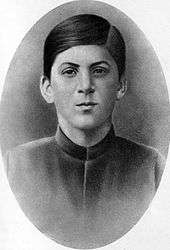
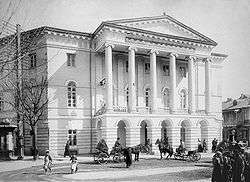
In 1894, at the age of 15, he enrolled at the Orthodox Seminary of Tiflis, to which he had been awarded a scholarship. The teachers at Tiflis Seminary were also determined to impose Russian language and culture on the Georgian students.[1] Like many of his comrades, young Ioseb reacted by being drawn to Georgian patriotism. For a time, he wrote Georgian poetry, for which he gained some fame.
During his time at the seminary, Ioseb and numerous other students read forbidden literature that included Victor Hugo novels and revolutionary, including Marxist, material. He was caught and punished numerous times for this. He became an atheist in his first year.[6] He insisted his peers call him "Koba", after the Robin Hood-like protagonist of the novel The Patricide by Alexander Kazbegi; he continued to use this pseudonym as a revolutionary.[7][8] In August 1898, he joined the Russian Social-Democratic Labour Party, a Marxist organization from which the Bolsheviks would later form.
Shortly before the final exams, the Seminary abruptly raised school fees. Unable to pay, Ioseb quit the seminary in 1899 and missed his exams, for which he was officially expelled.[9] Shortly after leaving school, Ioseb discovered the writings of Vladimir Lenin and decided to become a revolutionary.
Beginnings as a Marxist revolutionary
Early adulthood in Tiflis
After abandoning his priestly education, Jughashvili took a job as a clerk at the Tiflis Meteorological Observatory. Although the pay was relatively low (20 roubles a month), his workload was light, giving him plenty of time for revolutionary activities. He would organize strikes, lead demonstrations and give speeches. He soon caught the attention of the Tsar's secret police, the Okhranka.[1]
On the night of 3 April 1901, the Okhranka arrested a number of SD Party leaders in Tiflis. Jughashvili was riding the tram to work when he spotted their agents waiting to ambush him outside the Observatory. He stayed on the tram and avoided capture.[10] He went underground, becoming a full-time revolutionary, living off donations from friends, sympathizers and his party. He began writing revolutionary articles for the Baku-based radical newspaper Brdzola ("Struggle").[1]
Political organization beginnings
In October, he fled to Batumi and got work at an oil refinery owned by the Rothschilds. In 1902, a fire broke out at the refinery, and it is strongly suspected Jughashvili was involved.[11] The workers were entitled to a bonus for putting out the fire, but the manager suspected arson and refused to pay. In response, Jughashvili organized a series of strikes, which in turn led to arrests and street clashes with Cossacks. In one attempt to break their comrades out of prison, 13 strikers were killed when Cossacks intervened. Jughashvili distributed pamphlets portraying the dead as martyrs. On 18 April 1902, the authorities finally arrested Jughashvili at a secret meeting. At his trial, Jughashvili was acquitted of leading the riots due to lack of evidence, but was kept in custody whilst the authorities investigated his activities in Tiflis.
Joining the Bolsheviks
Jughashvili ended up in the Siberian village of Novaya Uda on 9 December 1903. During this time, he heard that two rival factions within the Social-Democrats had formed: the Bolsheviks under Lenin and the Mensheviks under Julius Martov. Jughashvili, already an admirer, decided to join Lenin's group. He managed to obtain false papers and, on 17 January 1904, escaped Siberia by train, arriving back in Tiflis ten days later.[12]
With no income, Jughashvili lived off his circle of friends. One of them introduced him to Lev Kamenev (then known as Lev Rosenfeld), his future co-ruler of the USSR after Lenin's death. At this time, Jughashvili favored a Georgian Social-Democratic party, which caused a rift with the majority who favored international Marxism. Threatened with expulsion, he was forced to write Credo, a paper renouncing his views (because this paper distanced him from Lenin, when Stalin became ruler of the USSR, he tried to destroy all copies of this Credo, and many of those who had read it were shot).[13]
The following month, the Russo-Japanese War broke out between Japan and Russia. The war, which would eventually end in Russia's defeat, severely strained the Russian economy and caused a great deal of unrest in Georgia. Jughashvili travelled across Georgia conducting political activity for his party. He also worked to undermine the Mensheviks through a campaign of slander and intrigue. These efforts brought him to Lenin's attention.
On 22 January 1905, Jughashvili was in Baku when Cossacks attacked a mass demonstration of workers, killing 200. This was part of a series of events which sparked the Russian Revolution of 1905. Riots, peasant uprisings and ethnic massacres swept the Russian Empire. In February, ethnic Azeris and Armenians were slaughtering each other in the streets of Baku. Commanding a squad of armed Bolsheviks, Jughashvili ran protection rackets to raise party funds and stole printing equipment. Afterward, he headed west, where he continued to campaign against the Mensheviks, who enjoyed overwhelming support in Georgia. In the mining town of Chiatura, both Jughashvili and the Mensheviks competed for the support of the miners. They chose Jughashvili, preferring his plain and concise manner of speaking to the flamboyant oratory of the Menshevik speaker.[14] From Chiatura, Jughashvili organized and armed Bolshevik militias across Georgia. With them, he ran protection rackets among the wealthy and waged guerrilla warfare on Cossacks, policemen and the Okhranka.[1] Later that year, in the townhouse in which he had moved in Tiflis, he met Ekaterina Svanidze, who would become his first wife.
Meeting Lenin and early politics
In December 1905, Jughashvili and two other activists were elected to represent the Caucasus at the next Bolshevik conference, which took place in Tampere, Finland. There, on 7 January 1906, Jughashvili met Lenin in person for the first time. Although Jughashvili was impressed by Lenin's personality and intellect, he was not afraid to contradict him. He objected to Lenin's proposal that they take part in elections to the recently formed Russian parliament, the Duma.[15] At the conference he also met Yemelyan Yaroslavsky, his future propaganda chief, and Solomon Lozovsky, his future Deputy Foreign Commissar. After the conference, Jughashvili returned to Georgia, where Cossack troops were brutally trying to reconquer the rebellious region for the Tsar. In Tiflis, Jughashvili and the Mensheviks plotted the assassination of Major General Fyodor Gryaznov, which was carried out at the end of January 1906.[16] Jughashvili continued to raise money for the Bolsheviks through extortion, bank robberies and hold-ups.
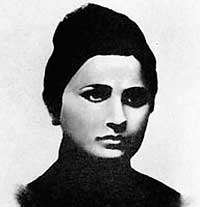
In April 1906, Jughashvili attended the Fourth Congress of the Russian Social Democratic Labour Party. At the conference, he met Kliment Voroshilov, his future Defence Commissar and First Marshal; Felix Dzerzhinsky, future founder of the Cheka; and Grigory Zinoviev, with whom he would share power after Lenin's death. The Congress, in which the Bolsheviks were outnumbered, voted to ban bank robberies. This upset Lenin, who needed the bank robberies to raise money.[17]
Jughashvili married Ekaterina Svanidze on 28 July 1906. On 31 March 1907, she gave birth to Jughashvili's first child, Yakov. Jughashvili and Lenin both attended the Fifth Congress of the Russian Social Democratic Labour Party in London in 1907.[18] This Congress consolidated the supremacy of Lenin's Bolshevik faction and debated strategy for communist revolution in Russia. Here, Jughashvili first met Leon Trotsky in person. Jughashvili disliked him from the start, calling him "pretty, but useless."[19] After the conference, Jughashvili would begin to switch his focus away from Georgia, which was rife with feuding and dominated by the Mensheviks, to Russia, and he began writing in Russian.
1907 Tiflis bank robbery
After returning to Tiflis, Jughashvili organized the robbing of a large delivery of money to the Imperial Bank on 26 June 1907. Jughashvili's gang ambushed the armed convoy in Yerevan Square with gunfire and homemade bombs. Around 40 people were killed, but all of Jughashvili's gang managed to escape alive with up to 341,000 rubles (about US$3.4 million in modern terms).[1] Jughashvili and his family fled Tiflis two days later. A henchman delivered the money to Lenin in Finland, who then fled with it to Geneva. The Mensheviks, who had banned bank robberies (and did not get to share in the loot), were outraged. Jughashvili escaped expulsion, though the affair would cause him trouble for years to come.
Return to Baku
Jughashvili's family moved to Baku. Whilst Jughashvili continued his revolutionary activities, his wife fell ill from Baku's pollution, heat, stress and malnutrition. She contracted typhus and died on 5 December 1907. Jughashvili was overcome with grief and retreated into mourning for several months. The loss also hardened him; he told a friend: "with her died my last warm feelings for humanity".[1] He abandoned his son, Yakov, who was raised by his deceased wife's family.
When Jughashvili resumed his activities, he organized more strikes and agitation, this time focusing on the Muslim Azeri and Persian workers in Baku. He helped found a Muslim Bolshevik group called Hummet, and also supported the Persian Constitutional Revolution with manpower and weapons, and even visited Persia to organize partisans.[20] Jughashvili ordered the murders of many Black Hundreds (radical supporters of the Tsar) and conducted protection rackets and ransom kidnappings against the oil tycoons of Baku. He also conducted counterfeiting operations and robberies. He befriended criminal gangs, and used them to obstruct the Mensheviks. Jughashvili's gangsterism upset the Bolshevik intelligentsia, but he was too influential and indispensable to oppose.[21]
The Okhranka tracked down and arrested Jughashvili on 7 April 1908. After seven months in prison, he was sentenced to two years' exile. He arrived in the village of Solvychegodsk in early March 1909.[22] After seven months in exile, he disguised himself as a woman and escaped on a train to St Petersburg. He returned to Baku in late July.[23]
Adopting the name Stalin
Jughashvili started using his assumed name of "Stalin", roughly translating as ‘man of steel’, in 1910. In addition to fostering his hard-lined image, the moniker was supposedly adopted in an effort to shield his real identity from the police whilst involved in evasive revolutionary activity.
Bolshevik politics and exiles
Spy hunting and exile
The Bolsheviks were on the verge of collapse due to Okhranka activity within the Empire and infighting among the intelligentsia abroad. In desperation, he advocated a reconciliation with the Mensheviks (which Lenin opposed). He demanded the creation of a Russian Bureau to run the Social-Democratic Party from within the Empire, to which he was appointed. Stalin soon realized the Bolsheviks had been heavily infiltrated by Tsarist spies. He initiated a hunt for the traitors, but failed to root out any real spies - as revealed by Okhranka records - and caused much disarray in the Party.[24]
On 5 April 1910 Stalin was yet again arrested by the Okhranka. He was banned from the Caucasus for five years and sentenced to complete his previous exile in Solvychegodsk. He was deported back there in September. In early 1911, Stalin's friends tried to sneak him some money to help his escape, but the fellow exile who was supposed to deliver the money instead kept it for himself - Stalin had the man shot in 1937 - and he was forced to return to Solvychegodsk.[25] During his exile, he had an affair with his landlady, Maria Kuzakova, with whom he fathered a son, Konstantin. Stalin was released on 1 July 1911, while Maria was still pregnant. Stalin moved to Vologda in late July, where he had been ordered to reside for two months.[26]
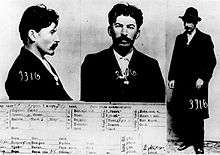
In January 1912, at the Prague Party Conference, Lenin led his Bolshevik faction out of the Russian Social Democratic Labour Party, founding the separate Bolshevik Party. A Central Committee was elected, but when some of its members returned to Russia, they were arrested by the Okhranka, having been secretly betrayed by fellow CC member Roman Malinovsky, an Okhranka spy. To fill the void, Lenin and Grigory Zinoviev coopted Stalin as a member of the Central Committee.[27] When Stalin was informed of this, he left Vologda in late February.
Creating Pravda and further exile
Stalin moved to Saint Petersburg in March 1912, lodging with Kavtaradze, maths tutor to the Alliluyev sisters. He took control of the Bolshevik weekly newspaper Zvezda. Stalin had been assigned to convert Zvezda into a daily and rename it Pravda. Initially, Stalin ran Zvezda from the home of Bolshevik Duma deputy Poletaev who was also a poet and was immune from arrest. The first issue of Pravda was published in 3 rooms on 5 May. It was legal at first even though its editor-in-chief, Stalin, was not. Another founder Vyacheslav Molotov whose old friend, Victor Tikhomirnov, was the son of a Kazan capitalist and funded Pravda with his inheritance.
Shortly afterwards, the Okhranka caught up with him again. On 2 July 1912 he was again exiled to Siberia for three years, this time to the small village of Narym. He escaped just thirty-eight days after arriving; this was his shortest exile.[28] He returned to Saint Petersburg in September.
Stalin renewed his efforts to reconcile the Bolsheviks with the Mensheviks in the hope of salvaging the then struggling Marxist movement. He published editorials in Pravda advocating reconciliation, and secretly met with Menshevik leaders Noe Zhordania and Jibladze on several occasions. He turned down 47 of Lenin's articles, reaffirming his willingness to disagree with Lenin. This angered Lenin, who twice summoned Stalin to Krakow to argue policy. On the second visit at the end of 1912, Stalin was replaced by Sverdlov as editor-in-chief of Pravda, but was made senior leader of the Russian Bureau of the Bolshevik Party, and paid 2 rubles a day. Lenin also asked Stalin to write an essay laying out the Bolshevik position on national minorities.
After Krakow, Stalin spent several weeks in Vienna with a wealthy Bolshevik couple he met with Lenin in Krakow. While there he met for the first time Nikolai Bukharin, who would become a leading politician in the future Soviet government. They continued to discuss the issue of nationalities. Stalin completed his essay on the topic, entitled "Marxism and the National Question", which was published in March 1913.
Return and another exile
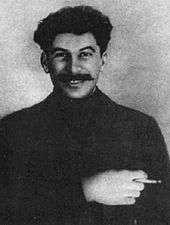
Stalin returned to Saint Petersburg in February 1913. During this time, many Bolsheviks, including almost the entire Central Committee, had been arrested by the Okhranka, having been betrayed by Roman Malinovsky, a high-ranking Bolshevik who for years had been an Okhranka spy and agent provocateur. That month, an article had been published that outed Malinovsky as a spy, but the Bolsheviks dismissed it as Menshevik libel (ironically, Lenin and Stalin were his strongest defenders). On 8 March Malinovsky persuaded Stalin to attend a Bolshevik fundraising ball, which was raided by the Okhranka.
Stalin was condemned to four years in the remote Siberian province of Turukhansk. He was eventually joined by Kamenev and several other Bolshevik exiles. He spent six months in the small hamlet of Kostino on the Yenisei River. After learning that Stalin was planning an escape (he had received money and supplies from his comrades), the authorities moved him north to Kureika, a hamlet on the edge of the Arctic Circle. There, he lived the life of a hunter-gatherer, having learned fishing and hunting from local Siberian tribesmen. While there he began a 2-year affair with Lidia Pereprygina, then aged 13, with whom he fathered two children. The first died in infancy; the second, named Alexander, was born in April 1917.
In late 1916, Stalin was conscripted into the army. He was taken to Krasnoyarsk in February 1917, but the medical examiner there found him unfit for service due to his damaged left arm.[29] He spent his last four months of exile in the village of Achinsk.
Name and aliases
Stalin's first name is also transliterated as "Iosif". His original surname, ჯუღაშვილი, is transliterated as "Jughashvili" or J̌uḡašvili. The Russian transliteration is "Джугашвили", which is in turn transliterated into English as "Dzhugashvili" and "Djugashvili"; -შვილი ("-shvili") is a Georgian suffix meaning "child" or "son".
There are several etymologies of the jugha (ჯუღა) root. In one version, the name derives from the village of Jugaani in Kakhetia, eastern Georgia.[30]
Neo-Nazi and other anti-Semitic sources have claimed that "Dzhuga" or "Jugha" means "Jew" in Georgian and hence "Dzhugashvili" literally means "Jew-son" or son of a Jew. This is incorrect as the word for "Jew" in Georgian is "ebraeli" (ებრაელი).
An article in the newspaper Pravda in 1988 claimed the word derives from the Old Georgian for "steel" which might be the reason for his adoption of the name Stalin. Сталин ("Stalin") is derived from combining the Russian сталь ("stal"), "steel", with the possessive suffix -ин ("-in"), a formula used by many other Bolsheviks, including Lenin.
According to theories advanced by Mihail Vayskopf,[31] it is the Ossetian for "herd of sheep"; the surname "Jugayev" is common among Ossetians, and before the revolution names in South Ossetia were traditionally written with the Georgian suffix, especially among Christianized Ossetians. Allusions to the hypothesis of Ossetian ethnicity of Stalin are present in the important Stalin Epigram by Osip Mandelstam:
..When he has an execution it's a special treat,
..And the Ossetian chest swells. (Translation by A. S. Kline)
Like many outlaws, Stalin used many aliases throughout his revolutionary career, of which "Stalin" was only the last. During his education in Tiflis, he picked up the nickname "Koba", after the Robin Hood-like protagonist from the 1883 novel The Patricide by Alexander Kazbegi. This became his favorite nickname throughout his revolutionary life.[7][8] Stalin continued to use Koba as his Party name in the underground world of the RSDLP. During conversations, Lenin called Stalin "Koba". Among his friends he was sometimes known by his childhood nickname "Soso" – a Georgian diminutive form of the name Ioseb.
Stalin is also reported to have used at least a dozen other nicknames, pseudonyms and aliases such as "Josef Besoshvili"; "Ivanov"; "A. Ivanovich"; "Soselo" (a youthful nickname), "K. Kato"; "G. Nizheradze"; "Chizhikov" or "Chizhnikov"; "Petrov"; "Vissarionovich"; "Vassilyi".[32] Directly following World War II, as the Soviets were negotiating with the Allies, Stalin often sent directions to Molotov as "Druzhkov".
Date of birth
For a long time, Stalin's date of birth was falsified. Although there is an inconsistency among published sources about Stalin's year and date of birth, Iosif Dzhugashvili is found in the records of the Uspensky Church in Gori, Georgia as born on 18 December (Old Style: 6 December) 1878. This birth date is maintained in his School Leaving Certificate, his extensive tsarist Russia police file, a police arrest record from 18 April 1902 which gave his age as 23 years, and all other surviving pre-Revolution documents. As late as 1921, Stalin himself listed his birthday as 18 December 1878 in a curriculum vitae in his own handwriting. However, after his coming to power in 1922, Stalin changed the date to 21 December [O.S. 9 December] 1879. That became the day his birthday was celebrated in the Soviet Union.[33]
Rumours of being an Okhranka agent
Stalin's apparent ease in escaping from Tsarist persecution and very light sentences led to rumours that he was an Okhranka agent. His efforts in 1909 to root out traitors caused much strife within the party; some accused him of doing this deliberately on the orders of the Okhranka. The Menshevik Razhden Arsenidze accused Stalin of betraying comrades he did not like to the Okhranka. The prominent Bolshevik Stepan Shahumyan directly accused Stalin of being an Okhrana agent in 1916. According to his personal secretary Olga Shatunovskaya, these opinions were shared by Stanislav Kosior, Iona Yakir and other prominent Bolsheviks.[34] The rumours were reinforced by being published in the Soviet Union memoirs of Domenty Vadachkory, who wrote that Stalin used an Okhranka badge (supposedly stolen) to help him escape exile.[35] It also appears suspicious that Stalin played down the number of his escapes from prisons and exiles.[34][36][37] Still there was no hard evidence of Stalin's collaboration with the Okhranka and a few alleged reports from Stalin to the Okhranka published by the media appear to be forgeries.[35]
Historian Simon Sebag Montefiore found that in all surviving Okhranka records Stalin is described as a revolutionary and never as a spy.[1] Montefiore argued that Stalin escaped from his exiles so frequently because the exile system was not secure: an exile only needed money and false papers to escape the village where he was settled, and thousands did.[1] Stalin also had spies of his own in the Okhranka, warning him of their actions. In 1956, the magazine Life published a letter by Colonel Ermin, head of the Tiflis Okhranka, which stated that Stalin was an agent,[38] but it has since been shown to be a forgery.[39] In his 1967 biography of Stalin, Edward Ellis Smith argued that Stalin was an Okhranka agent by citing his suspicious ability to escape from Okhranka dragnets, travel unimpeded, and rabble-rouse full-time with no apparent source of income. One such example was the raid that occurred on the night of 3 April 1901, when nearly everyone of importance in the Socialist-Democratic movement in Tiflis was arrested, except for Stalin, who was apparently "enjoying the balmy spring air, and in one of his to-hell-with-the-revolution moods, [which] is too impossible for serious consideration."[40] Montefiore, however, wrote that Stalin spotted Okhranka agents waiting for him outside his place of employment whilst he was riding a tram; he stayed on the tram and immediately went into hiding.
References
- 1 2 3 4 5 6 7 8 9 10 11 12 13 14 15 Montefiore 2007
- ↑ Ludwig, Arnold M., King of the Mountain: The Nature of Political Leadership, University Press of Kentucky, 2002, ISBN 0-8131-9068-1 p.152
- ↑ Montefiore 2007, p. 26
- ↑ Montefiore 2007, p. 28, ch. 2
- ↑ Famous interview with Journalist Emil Ludwig
- ↑ Montefiore 2007, p. 54, ch. 6
- 1 2 Service 2008, p. 28
- 1 2 Radzinsky 1997, pp. 37
- ↑ Montefiore 2007, p. 61, ch. 7
- ↑ Montefiore 2007, p. 69
- ↑ Montefiore 2007, p. 77. Jughashvili's complicity is implied in the memoirs of Constantine Kandelaki, a Social-Democrat and colleague of Jughashvili in Batumi at the time.
- ↑ Montefiore 2007, p. 100
- ↑ Montefiore 2007, p. 101
- ↑ Montefiore 2007, p. 111
- ↑ Montefiore 2007, p. 125
- ↑ "Assassination of Griaznoff" (PDF). Los Angeles Herald. 31 January 1906.
- ↑ Montefiore 2007, p. 135
- ↑ Gould, Mark; Revill, Jo (24 October 2004). "Luxury beckons for East End's house of history". London: The Guardian. Retrieved 19 July 2008.
- ↑ Montefiore 2007, p. 148
- ↑ Montefiore 2007, p. 167, ch. 22
- ↑ Montefiore 2007, p. 171
- ↑ Montefiore 2007, p. 177
- ↑ Montefiore 2007, p. 182
- ↑ Montefiore 2007, p. 185, ch. 25
- ↑ Montefiore 2007, p. 196, ch. 26
- ↑ Montefiore 2007, p. 198
- ↑ Service 2008
- ↑ Montefiore 2007, ch. 28
- ↑ Montefiore 2007, p. 261, ch. 37
- ↑ Предки Сталина (Russian)
- ↑ "ИМЯ СТАЛИН" (Russian)
- ↑ Montefiore, Simon. "Epilogue". Young Stalin (paperback) (2007 Costa biography winner ed.). Britain: Weidenfeld & Nicolson. p. 395. ISBN 0-297-85068-7.
- ↑ "Prominent figures". State and Power in Russia. Retrieved 19 July 2008.
- 1 2 Radzinsky 1997, pp. 79–81, sub ch. "Koba: The Riddle of Riddles"
- 1 2 Агент Охранки или провокатор по призванию? by Sergey Zemlyanoy Nezavisimaya Gazeta 3 July 2002 (Russian)
- ↑ Тайные грабежи Сталина крышевал Ленин Komsomolskaya Pravda 13 November 2008
- ↑ СТАЛИН - АГЕНТ ОХРАНКИ: ЗА И ПРОТИВ by A. Ostrovsky (Russian)
- ↑ Roman Brackman (2001). The Secret File of Joseph Stalin: A Hidden Life. Frank Cass. ISBN 978-0-7146-5050-0.
- ↑ Montefiore 2007, p. 188, ch. 25
- ↑ Smith, Edward Ellis.The Young Stalin. New York: Farrar, Straus and Giroux, 1967. pg 77.
- Montefiore, Simon Sebag (2007), Young Stalin, Weidenfeld & Nicolson, ISBN 978-0-297-85068-7
- Radzinsky, Edvard (1997), Stalin: The First In-depth Biography Based on Explosive New Documents from Russia's Secret Archives, Anchor, ISBN 978-0-385-47954-7
- Service, Robert (2008) [2004], Stalin: A Biography, Pan Macmillan, ISBN 978-0-330-47637-9
